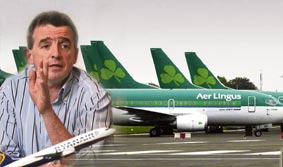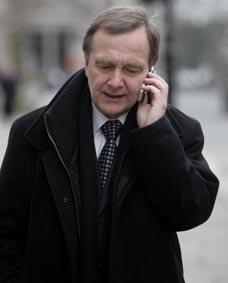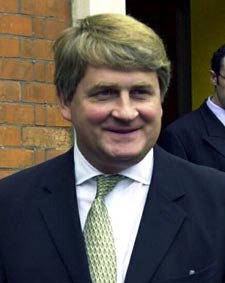Michael O'Leary's dawn raid
Whether or not Michael O'Leary succeeds in getting control of Aer Lingus, he has already put the airline and the government into a tailspin, which might have been the purpose of the exercise from the outset. By Martin Fitzpatrick
In one swift manoeuvre Michael O'Leary has confounded his rival airline; inflicted trauma on the already hapless Minister for Transport, Martin Cullen; put the competition authorities in Dublin in a tailspin; propelled the airline trade unions into figures of eight; and driven the Aer Lingus Esot to check the dictionary for the meaning of moral dilemma.
Nevertheless, as of writing, all the indications are that Ryanair will have to settle for something less than control of Aer Lingus. The weight of shares pledged against his hostile €1.4bn bid for what used to be called the national airline has been steadily mounting and the odds against Ryanair capturing the 50 per cent holding it claimed to have targeted are getting longer and longer as the Aer Lingus allies pile in.
It's still a possibility, of course, Ryanair will increase the value of its bid and that could change the balance of power.
However, the market may think that the Ryanair bid has only commercial logic. If so it is losing sight of the possibility that the purpose of the bid from the phenomenally capricious Michael O'Leary may already have been served.
The moment O'Leary made his dawn raid, getting Aer Lingus chairman John Sharman out of his bath and spoiling CEO Dermot Mannion's sailing holidays to inform them that the bid was on the way, a chain of events was triggered that lunged Aer Lingus into immediate crisis.
For a start, the bid has allowed O'Leary to pinpoint the weaknesses at Aer Lingus that observers knew about, but up to now have chosen to ignore. The Ryanair boss simply leapt at the chance to spell out the soft underbelly of its rival and especially its perceived over-manning.
O'Leary knows as much about his rivals as anyone. His analysis of where the overspending is and the cost-efficiencies that can be achieved is acute. A cold look at the clerical and catering sections of Aer Lingus present obvious opportunities for efficiencies. In his press conference O'Leary laid it on with a trowel. He forecast significant job losses if he were to get his mitts on Aer Lingus.
In the wake of these claims, and even if Ryanair was to fold its tent and go back whence it came, the market now knows about the clear inefficiencies at Aer Lingus and Mannion, who is still establishing his credentials at the Dublin Airport headquarters, will have to take careful stock of his rival's criticism. Moreover, if his institutional investors choose to remain loyal to the newly listed airline, they certainly cannot ignore the analysis – even if it is coming from the contrary and trouble-making O'Leary – and will have to ensure that Mannion puts it on the agenda for the next meeting.
 That is going to make the industrial-relations position at the airline even more fraught than it usually is.
That is going to make the industrial-relations position at the airline even more fraught than it usually is.
The act of making the bid has, of course, also sent an icy chill through the Department of Transport. After manoeuvring its way through the barriers to a flotation, the department, which is paid handsomely (and pays its consultants even more handsomely) to get the best advice, finds that it is O'Leary, of all people ,who has made it look like an ass.
The department should have anticipated that for any newly listed corporation, stake-building by a trade investor is always a very live possibility. When the Irish Permanent Building Society went public in the early 1990s something similar happened. A UK building society bought a strategic stake and though that never led to a bid, the practice is so common and should have been part of the calculations that the Department of Transport factored in. Did Martin Cullen's joyless band do so?
The evidence suggests that they didn't because as soon as the department saw the flotation successfully off its hands, they advanced their plans to sell an additional seven per cent of the company's shares into the market. It never seems to have dawned on them that this would give a predator – any predator – a glorious opportunity to build up a decent holding in the company.
The most embarrassed people in town must have been the Department of Transport officials who allowed O'Leary to snigger at them from behind his share certificates. That, of course, assumes that transport-department officials still embarrass-able.
The big challenge that Michael O'Leary faces, even if he were to do the remarkable and convince enough people to sell their shares to him for €2.80 per share, is how to square this with the competition people in Brussels. It is being reported that when O'Leary was working his way through the list of telephone messages on day one of the bid, one of his early calls was to the internal market supremo, Commissioner Charlie McCreevy.
The gossip suggests that Brussels then argued there should not be a problem for the bid on competition grounds. However, the situation may have changed and the strength of the Irish government's opposition to the deal will have influenced the commission. It was instructive to hear reports from London at the weekend portraying the Irish government's reaction to the bid as one of "betrayal", given the generous support that the Irish state has lavished on Ryanair in the past.
But whatever the spin, it is also true that Brussels cannot simply decide a matter like that without paying attention to the political reaction in Dublin. Already the analysts in all the big broking houses are busily tapping into their calculators working out what routes would have to be surrendered if the merger of the two airlines was to take place. Sober analysis suggests that the cost is high – many tens of millions from profitable routes.
The other outstanding feature of the Ryanair bid is the swift and decisive intervention of businessman Denis O'Brien in the affair. He strode purposefully into the market and spent around €30m, buying 2.1 per cent of Aer Lingus to pledge in support of the anti-Ryanair brigade. O'Brien, who said he always wanted to start an airline, could be miffed because Ryanair poked fun at him in one of their adverts (O'Brien became a tax exile in Malta and the Ryanair ads carried the news that they would fly you to Malta and all you had to pay was your (airport) taxes).
But is being miffed a reason to splash out €30m? With Denis O'Brien that may well be the case. He spent a lot more money causing fierce fluttering in the dovecoats at Independent News & Media by swooping on a three per cent stake in the O'Reilly newspaper empire. He has never explained the purpose of that holding. It may be he will choose to do the same thing at Aer Lingus.
Rich blokes are different - they don't have to explain.
